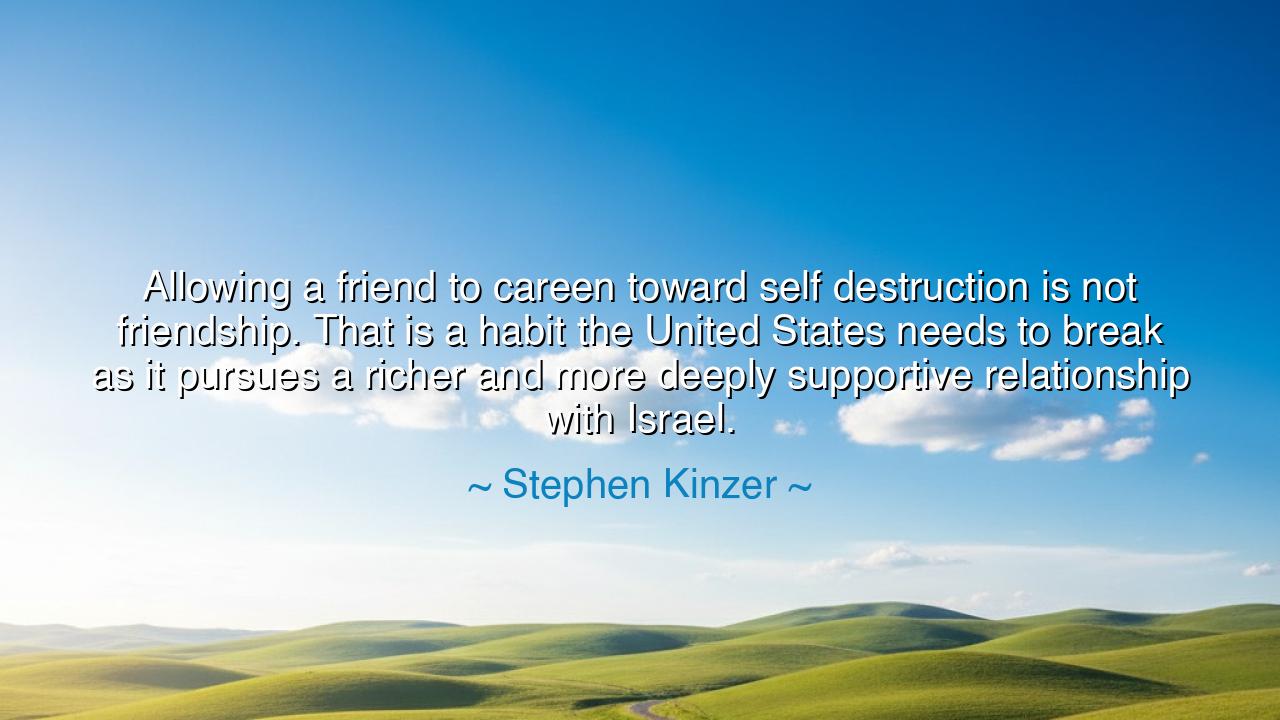
Allowing a friend to careen toward self destruction is not
Allowing a friend to careen toward self destruction is not friendship. That is a habit the United States needs to break as it pursues a richer and more deeply supportive relationship with Israel.






"Allowing a friend to careen toward self-destruction is not friendship. That is a habit the United States needs to break as it pursues a richer and more deeply supportive relationship with Israel." These words from Stephen Kinzer offer a profound and timely reflection on the nature of friendship, particularly the complexities that arise when one friend’s actions may lead them to their own destruction. Kinzer draws a critical parallel between personal relationships and the relationship between nations, urging us to examine the ways in which true friendship should not simply tolerate harmful behaviors, but actively seek to redirect those actions toward growth, understanding, and safety. To allow a friend to walk toward self-destruction, in this sense, is not an act of love, but of indifference—an act that betrays the very essence of genuine connection.
In the ancient world, the concept of friendship was deeply tied to a shared pursuit of virtue and well-being. Aristotle, in his writings on ethics, emphasized that true friendship is based on the desire for the good of the other person. He wrote that a friend is not someone who merely shares in your joy, but someone who is invested in your well-being, even if that means offering difficult truths or guidance when necessary. In this view, friendship is not a passive bond of mutual affection, but an active force that seeks to protect and elevate the other. Allowing a friend to harm themselves is, in this sense, a violation of the very spirit of friendship—it is a failure to care, to intervene, and to ensure the other’s safety.
Consider the story of Achilles and Patroclus in the Iliad. Their friendship is one of the most celebrated in ancient literature, not simply because they were companions in arms, but because they deeply cared for each other’s well-being. When Achilles withdrew from battle, it was not out of mere personal grievance, but out of a sense of profound grief and a desire to preserve his honor. However, when Patroclus entered the battle in Achilles’ place and met his demise, Achilles’ grief and rage were not just about losing his friend—they were about realizing that his inaction had allowed his closest companion to face danger without the protection of caution and wisdom. Achilles did not allow his friend to careen toward destruction without intervening, but Patroclus’ death became a tragic lesson in the importance of responsibility in relationships, whether of friendship or war.
Kinzer’s words, when applied to the relationship between the United States and Israel, speak to a similar truth. When a friend—whether a nation or an individual—is heading toward a dangerous path, true friendship requires more than mere allegiance or support. It requires the courage to say, “This path will harm you.” The United States has long had a complex and deeply rooted friendship with Israel, but Kinzer suggests that there comes a point where unquestioning loyalty—especially in matters of foreign policy—can be destructive, both for the friend and for the one offering support. To allow a friend to walk toward harm without intervening is to act with indifference, to fail in the sacred duty of friendship.
In history, we see numerous examples where nations, and even individuals, allowed misguided loyalties to lead to destruction. Consider the story of Rome’s relationship with Carthage before the Punic Wars. Initially, Rome and Carthage shared a kind of mutual respect, but as tensions grew, Rome’s failure to address Carthage’s ambitions and the growing dangers of their unchecked expansion eventually led to mutual destruction. Had Rome intervened more decisively, sooner, the course of history might have been different. In the same way, true friendship between nations should be founded not just on political or strategic interests, but on a moral commitment to the well-being of each other. If a nation’s policies or actions are leading them down a harmful path, true friends are obligated to confront those choices, even if it means challenging the other’s actions.
The lesson here for us is clear: friendship is not merely about standing by someone when the sun is shining. It is about standing by them when the storm clouds gather, offering both support and guidance. True friends do not allow each other to walk blindly toward self-destruction, whether in personal relationships or in the international arena. Kinzer urges us to break the habit of indifference, especially when the stakes are high. If we are to be true friends—whether as individuals or as nations—we must be willing to face the discomfort of intervening when necessary, of offering the difficult truth, and of taking a stand for the well-being of the other, even when it is hard.
In our own lives, we can take this wisdom to heart by learning to recognize when a friend or loved one is heading toward a dangerous path, and instead of offering blind support, we must have the courage to confront, to speak up, and to redirect them toward a safer and more fruitful direction. True friendship is not passive; it is active, vigilant, and sometimes requires us to challenge the very people we love. Just as nations must have the moral courage to lead with wisdom, we too must lead our relationships with the same conviction—always with the goal of helping our friends become the best versions of themselves, even if that means confronting difficult truths.






AAdministratorAdministrator
Welcome, honored guests. Please leave a comment, we will respond soon